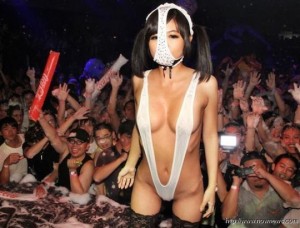“Hentai is brilliant”: British game show contestant wins round with Japanese sexual concept
Popular, long-running British game show Countdown has attracted an unusual flurry of headlines and online responses by allowing a “pornographic” concept to win a round.
In the long-running TV show, contestants try to find the longest words from a random selection of letters within 30 seconds.
On Monday’s episode, Marwan Riach managed to find “hentai” and beat out his opponent’s “patty.”
The resident judge in the “Dictionary Corner” confirmed the validity of Riach’s somewhat sheepishly offered word: “Hentai is brilliant,” she said in a widely shared clip.
Well, quite.

With its customary subtlety, the mainstream media has reported that hentai is “a genre of sexually explicit or pornographic anime or manga.” Countdown did not mention the sexual nature of hentai, which is not a big surprise given its afternoon broadcast time slot.
According to the Oxford Dictionary, the definition, media explained, goes further:
…”a subgenre of the Japanese genres of manga and anime, characterised by overtly sexualised characters and sexually explicit images and plots.”
It originates from the Japanese words hentai seiyoku sha, which means someone who is perverted, and came into its current use in the 1990s.
Despite his knowledge of Japanese words, Riach nonetheless went on to lose the game overall.
We are delighted to see that hentai is winning props overseas, though as always the focus is a little off.
The word is a much more common one in Japan that many people realize.
In fact, according to the prominent queer studies scholar Mark McLelland, who has provided a very useful short history of hentai, the use of “hentai” to refer to a specific “genre” is essentially restricted to the English-speaking discourse.
Hentai is, says McLelland, a “Sino-Japanese compound term widely used in modern Japanese to designate a person, action or state that is considered queer or perverse, particularly in a sexual sense.”
A Yahoo search for “hentai,” for instance, produces over 7 million hits — more than twice that of better-known loanwords such as samurai, geisha or sushi. This astonishing number is evidence of the popularity of a genre of erotic manga and anime referred to as hentai or sometimes the abbreviation “H” (pronounced etchi in Japanese) by western fans. However, despite the popularity of the genre and its massive presence on the internet, the category hentai is not discussed in English-language studies of manga and anime. […]
Why is this so? The reason is not prudishness but rather the fact that use of the term hentai to refer to erotic or sexual manga and anime in general is not a Japanese but an English innovation. In Japanese hentai can reference sexual material but only of an extreme, “abnormal” or “perverse” kind; it is not a general category. The Japanese use of hentai refers to both same-sex and heterosexual activities which are considered unusual but also extreme. While in Japanese both “H”/etchi and ero [erotic] can be used to refer to manga and anime with sexual content, hentai is only used to refer to unusual or perverse sexual situations — this might be number of partners as in gang rape, or bizarre partners as in aliens or monsters or illicit partners as in children (rorikon and shotakon). Hence in the Japanese case, hentai manga/anime is a subdivision of the much broader category of ero manga whereas in English hentai has come to signify the genre of ero manga as a whole.
He concludes that hentai is, “in the context of western manga and anime fandom, no longer a ‘Japanese’ word but has become a loanword with its own specific meaning and nuance.”
McLelland continues his detailed yet accessible study, including a discussion on the idea of “hentai” in the Meiji and Taisho prewar periods. Though it is quite a few years old now and would probably need updating to reflect more recent shifts, his article is very recommended for readers!
Naturally we have similar issues when it comes to words like “otaku” and “lolicon” that are complicated and problematic enough locally, but which have taken on different lives after leaving purely Japanese-language discourse.















1 Comment
I don’t like this.
Usually because it results in the UK trying to claim moral superiority over Japan by asking them to ban stuff because it makes them uncomfortable…